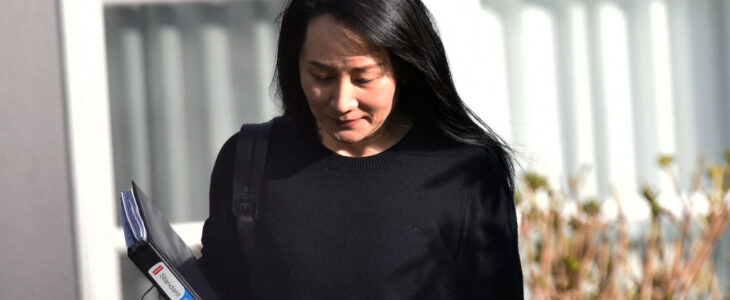
The Canadian judge in Meng Wanzhou’s extradition case on Thursday questioned the government’s lawyers about why a senior police officer refused to testify, suggesting it defies “ordinary logic and experience.”
Huawei Chief Financial Officer, Meng Wanzhou, leaves her Vancouver home to attend British Columbia Supreme Court, in Vancouver, British Colombia on March 22, 2021. (Photo by Don MacKinnon / AFP)

The Canadian judge in Meng Wanzhou’s extradition case on Thursday questioned the government’s lawyers about why a senior police officer refused to testify, suggesting it defies “ordinary logic and experience.”x
Associate Chief Justice Heather Holmes interrupted Canada’s lawyer after he was unable to tell her the reason why retired Royal Canadian Mounted Police staff sergeant Ben Chang would not be cross-examined.

Meng, Huawei Technologies’ chief financial officer, alleges that Chang sent her phone information and passcodes to the FBI, after they were improperly handed to the RCMP by Canadian border guards. The claim is a pillar of allegations that Canada abused her rights during her three-hour interrogation without a lawyer at Vancouver airport in 2018.
“He was a senior police officer,” Holmes said. “Generally retired police officers testify in relation to cases they were involved with before their retirement, and that’s not happening here. So I’m not sure that the principle that one is to work with ordinary logic and experience can have much useful application here, or that it can assist the Attorney General’s position.”
Meng faces US fraud and conspiracy charges over a Huawei subsidiary’s activities in Iran, allegedly violating US sanctions. Meng and the Chinese telecom giant deny wrongdoing.
Meng’s lawyers argued this week Chang is “the most important witness,” and said his refusal to testify is “unprecedented,” particularly since police destroyed all his files when he retired.
“Staff sergeant Chang did not share the information,” Canada’s lawyer John Gibb-Carsley said. “It’s another example of (Meng’s lawyers) attempting to fill a vacuum in evidence with speculative assertions… The conduct of the RCMP was to take steps for valid police objectives.”
Chang retired after Meng’s arrest to take a security job in a casino in Macau, a Chinese-controlled territory. In an affidavit, he denied sending the FBI information, contrary to another senior RCMP officer’s notes — which Canada dismissed as “hearsay.”
“There’s a certain shock value in the fact a senior police officer would refuse to testify on an affidavit he filed before the court,” Meng lawyer Scott Fenton said earlier this week. He alleged federal witnesses lied to the court and secretly gathered evidence from Meng for the FBI’s criminal investigation, and then tried to “conceal their misconduct.”
Canada filed a court document last year listing “witness safety” as the reason for Chang’s refusal.
The case is expected to end in mid-May, barring further appeals.
Credit:
